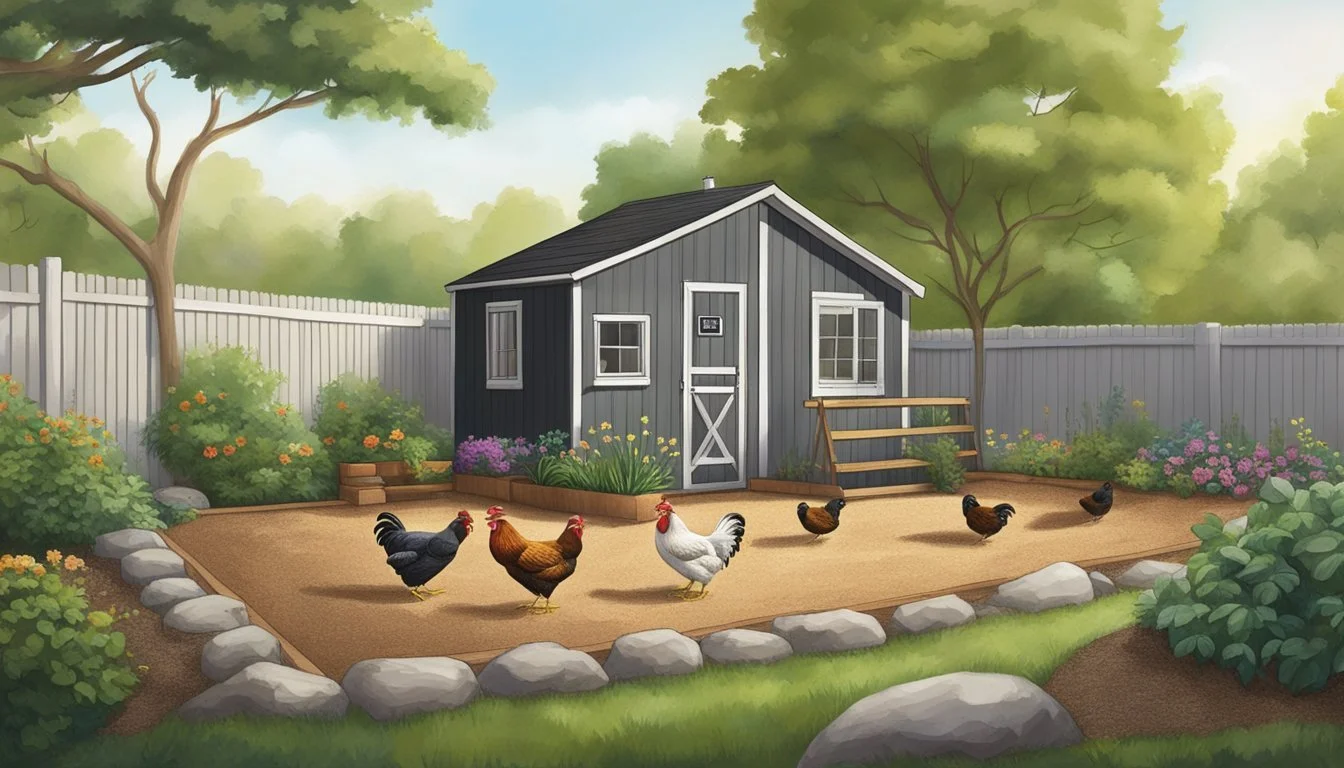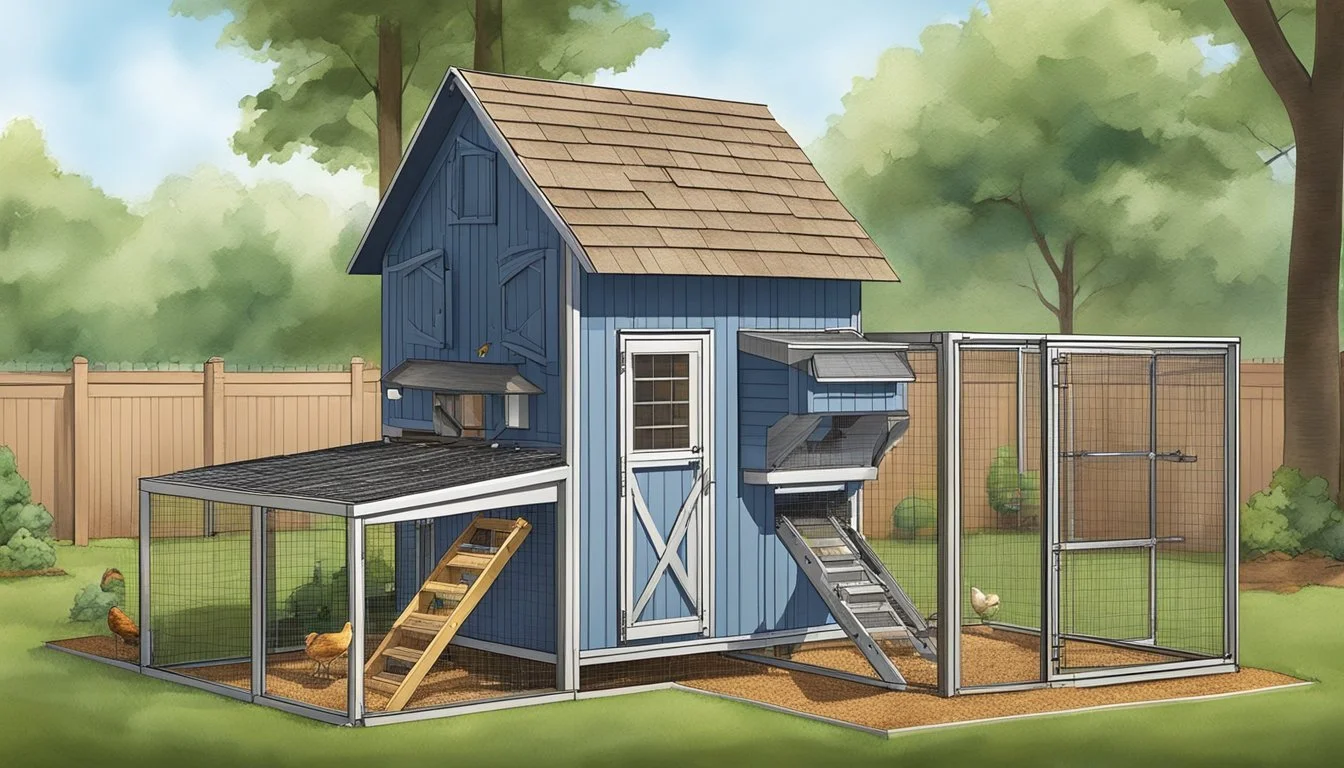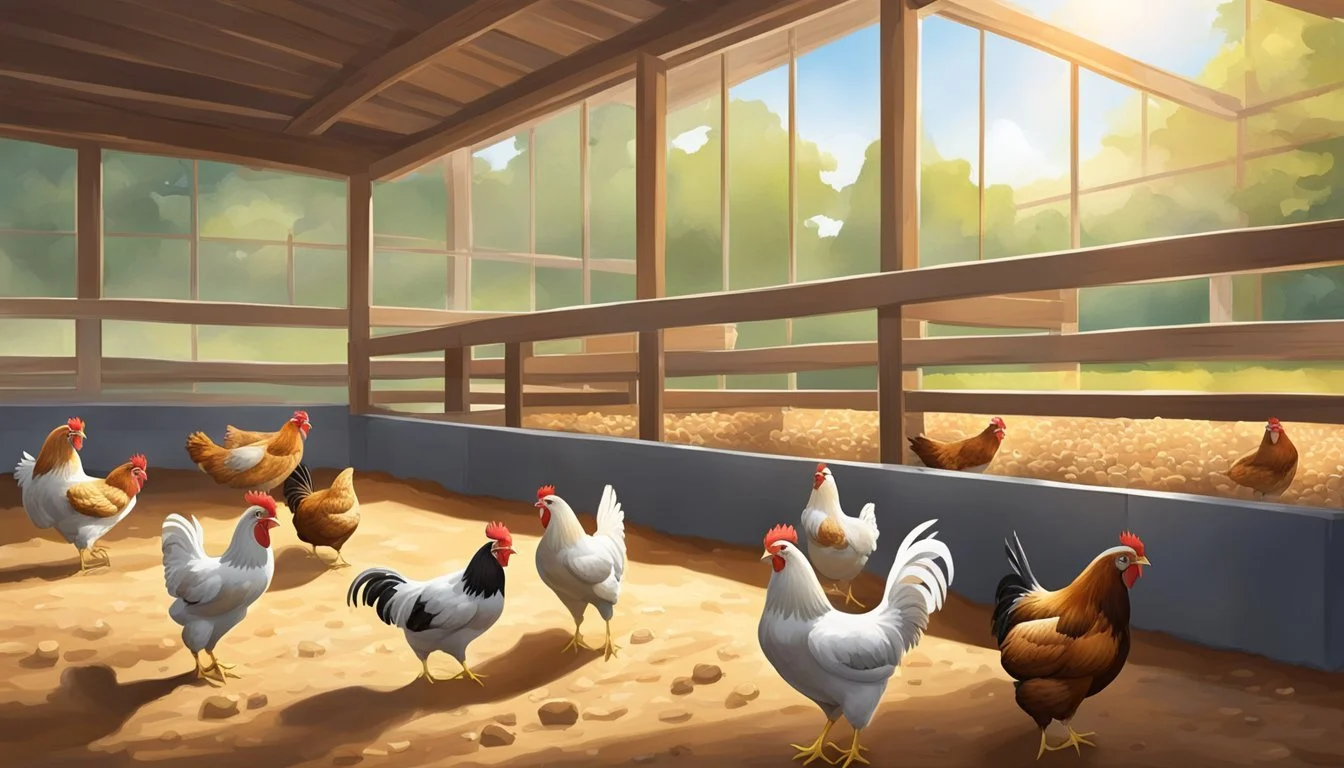Keeping Backyard Chickens in Lewisville, TX
Essential Guidelines for Local Poultry Enthusiasts
Keeping backyard chickens has become increasingly popular in Lewisville, Texas, as residents seek the benefits of fresh eggs and the joys of poultry companionship right in their own yards. The city of Lewisville permits residents to keep chickens, provided they adhere to certain ordinances that are designed to ensure the well-being of the animals as well as the harmonious coexistence with neighbors. These laws reflect an understanding of the importance of self-sufficiency and the simple pleasures of raising chickens, which have been highlighted by recent global events.
In Lewisville, the specifics of the ordinance require that residents have a minimum amount of space to house chickens, typically about an acre, which is a guideline to prevent overcrowding and to maintain a healthy environment for the birds. Those considering the venture should be aware of the city's regulations concerning coop structures, the number of chickens allowed, and the prohibition of roosters to avoid noise issues. Additionally, potential chicken owners should be conscious of the necessity to protect their flock from predators and to provide sufficient care and maintenance.
The community of Lewisville recognizes the dual role that chickens play as both pets and providers. They can be a source of natural pest control, as they consume insects, and their waste can be used as fertilizer, contributing to a more sustainable backyard ecosystem. Moreover, engaging with a community of local chicken enthusiasts, such as those found on social media platforms where Lewisville residents share tips and experiences, can be a valuable resource for anyone new to backyard chicken keeping.
Understanding Local Ordinances
Lewisville residents must comply with specific city ordinances when planning to keep backyard chickens, which includes understanding the associated permit fees and adherence to specified setback requirements.
Lewisville City Regulations
The City Council of Lewisville has enacted Ordinance No. 4025-10-2013, which amends its city code to regulate the keeping of chickens. One must acquire a permit with the associated fee to keep chickens within the city limits. This regulation ensures that chicken keeping is in line with health and safety standards. Additionally, several definitions and articles pertaining to the keeping of chickens are outlined, providing clarity on the requirements.
The city ordinance contains strict rules on the containment and care of chickens to prevent any nuisance or health issues. Failure to comply with these ordinances may lead to penalties or fines, ensuring residents maintain a certain standard in their chicken-keeping practices.
Setback Requirements and Restrictions
Setback requirements in Lewisville mandate that any enclosure meant to house chickens must be positioned a certain distance from neighboring residences, schools, and churches. The specific distances are:
Neighboring residences: Enclosures must be at least 50-150 feet away.
Schools and churches: Distances are stipulated by local regulations; check the Lewisville City Code for details.
These restrictions are in place not only to limit noise and odor affecting neighbors but also to ensure that the local environment remains conducive to community living standards. The Lewisville City Council enforces these regulations to balance the interests of chicken owners with those of the broader community.
Preparing Your Home for Chickens
When preparing one's home for keeping chickens in Lewisville, TX, it is important to ensure that the chosen space adheres to city regulations and provides a safe, comfortable habitat for the birds.
Choosing the Right Space
One must select a space for their chicken coop that is at least 25 feet from their home to comply with local ordinances. This distance helps to maintain sanitation and reduce noise. The selected area should also offer protection from Texas weather extremes and predators, ensuring the safety of the chickens.
Building a Suitable Coop
Constructing a chicken coop requires careful planning. It should be sturdy and well-ventilated, with sufficient space for the number of chickens one plans to keep. Typically, each chicken needs:
Nesting boxes: at least one for every three to four hens.
Roosts: minimum of 2 feet of roosting space per chicken.
Aside from space for nesting boxes and roosts, the coop must be designed to deter predators and keep chickens safe.
Securing Adequate Enclosures
Enclosures are necessary to provide chickens with space to forage while keeping them confined and protected from predators. A robust fence, ideally extending underground to prevent digging, is crucial. The enclosure should offer ample room for chickens to move freely, with experts recommending at least:
10 square feet: per chicken in an outdoor run.
The enclosure should also prevent chickens from escaping and ensure they are not a nuisance to neighbors, in adherence with local regulations.
Chicken Care Essentials
Providing your flock with proper care is crucial for their health and productivity. This includes consistent access to food and water and maintaining a clean environment that promotes their well-being.
Feeding and Watering Your Flock
Chickens require a balanced diet to stay healthy and lay quality eggs. A typical diet for a backyard chicken includes:
Layer pellets: These are formulated to provide all the necessary nutrients and are especially important for egg-laying hens.
Grit: Chickens don't have teeth, so grit helps them grind down food in their gizzard.
Calcium supplements: Often in the form of oyster shells, they are crucial for strong eggshells.
Fresh water should be available at all times. Waterers need to be clean and free of algae and contaminants. In colder climates, ensuring that the water does not freeze is also essential.
Maintaining a Clean and Healthy Habitat
Chickens need a safe and sanitary space to thrive. Their habitat should include:
Adequate space for exercise: Each chicken requires at least 3-4 square feet inside the coop and 8-10 square feet in an outdoor run.
Ventilation: Good airflow is vital to dispel dampness and odors, but direct drafts on the birds should be avoided.
Regular cleaning: Bedding should be changed regularly, and droppings should be removed to prevent disease.
It's also important to protect chickens from predators by securing the coop with sturdy materials and locks. Exercise and space not only keep chickens healthy but also promote natural behaviors such as foraging and dust bathing, which are critical for their overall well-being.
Legal Limitations and Restrictions
In Lewisville, Texas, residents interested in keeping backyard chickens must adhere to specific local ordinances that govern the types and numbers of chickens they can keep.
Rooster Ownership Rules
In Lewisville, the city code stipulates residents are not permitted to own roosters. This regulation is in place to mitigate noise concerns, which are common complaints in urban and suburban settings.
Limits on Flock Size
The ordinance further sets a limitation on the flock size. Residents are allowed to keep up to six chickens on properties less than one acre. It is important for chicken owners to ensure their flocks do not exceed this number to stay compliant with city regulations.
Choosing and Raising Chickens
Raising chickens in Lewisville, TX, involves careful selection of suitable breeds and understanding the lifecycle from chicks to layers to ensure a healthy flock and a steady supply of eggs.
Selecting Breeds Suitable for Lewisville
When considering chicken breeds for a backyard coop in Lewisville, potential keepers should look for breeds that can tolerate the Texas climate. Breeds such as the Plymouth Rock, Rhode Island Red, and Australorp are hardy and can handle both the heat and occasional cold snaps. Each breed offers its own advantages in terms of egg production, temperament, and care requirements.
Plymouth Rock: Known for its docility and steady egg production, typically yielding about 200 eggs per year.
Rhode Island Red: Renowned for its hardiness and is an excellent layer, with expectations of around 250 eggs annually.
Australorp: Has a notable egg-laying capacity and can produce upwards of 300 eggs in a year under optimal conditions.
The Lifecycle from Chicks to Layers
The journey from hatching eggs to full-fledged layers is critical for the success of a backyard flock. Initially, day-old chicks require a warm and secure brooder with temperatures carefully monitored and gradually decreased as they grow. By weeks 5-6, they can start to acclimate to the outdoors if weather permits.
At around 6 months of age, pullets – young hens that have yet to lay eggs – transition into layers. It's important to provide a comfortable nesting space and ensure a balanced diet to support their egg-laying needs. Adequate space for roosting and protection from predators is also essential throughout their lifecycle.
Chicks (0-6 weeks): Need a brooder with a temperature around 95°F, decreasing each week.
Pullets (6 weeks-6 months): Require grower feed and gradual introduction to outdoor living.
Layers: Should have nest boxes (1 per 4-5 hens) and receive layer feed for optimal egg production.
By selecting appropriate breeds and caring for chickens throughout their lifecycle, residents of Lewisville can enjoy the rewards of backyard poultry keeping.
Managing Chicken Behavior and Well-being
Effective management of chicken behavior and well-being is essential for any backyard flock in Lewisville, TX, particularly given local ordinances regarding space. With the right approach, chickens can exhibit healthy behaviors, which is vital for a successful backyard flock.
Egg Laying and Nesting Behaviors
Chickens require a comfortable and secure environment for egg-laying. It's important to provide an adequate number of nesting boxes to avoid competition that can lead to stress and reduced egg production. The thumb rule is one nesting box for every three to four hens. Nesting boxes should be filled with clean, soft bedding to encourage use and should be located in the darker, more secluded areas of the coop for privacy.
Nesting Box Essentials Description Privacy Secluded areas encourage laying. Bedding Clean, soft material to cushion eggs. Accessibility Easy access for hens and for egg collection. Cleanliness Regular cleaning to maintain health and encourage use.
Enrichment and Free-ranging
Chickens also require ample space for exercise to maintain their health and vigor. Ideally, allowing chickens to free-range gives them the opportunity to partake in natural behaviors such as foraging, which not only serves as exercise but also has therapeutic benefits. A secure area prevents predators from harming the chickens while they enjoy the outdoors.
Enrichment can include:
Perches: For roosting and exercise.
Dust baths: To help them keep clean and reduce parasites.
Varied terrain: Encourages exploratory behavior and foraging.
If free-ranging isn't feasible, ensure that the coop includes space for enrichment activities to facilitate physical exercise and mental well-being. Exercise is particularly important for roosters, as they tend to be more active and aggressive. Providing space and opportunities for movement can help mitigate these tendencies.
This section of the article highlights practices for managing egg-laying behaviors and nesting, alongside methods to provide enrichment and exercise through free-range access or alternative means within the coop. Understanding and meeting these needs can lead to healthier, happier chickens with a consistent egg-laying pattern.
Understanding Broader Texas Regulations
In Texas, backyard chicken keeping is subject to state-wide regulations as well as rules that vary by city. This section provides an overview of Texas regulations, with a focus on how they relate to various cities throughout the state.
Comparison with Neighboring Cities
Dallas
In Dallas, the city ordinances prohibit the ownership of roosters, aiming to reduce noise complaints and other nuisances.
Austin
Austin allows residents to keep chickens without a permit, provided their coop is kept 50 feet away from neighboring residences.
San Antonio
San Antonio takes a similar approach to Austin, with relaxed rules for keeping chickens while still maintaining certain standards for distance and coop maintenance.
Fort Worth
In Fort Worth, chicken owners must adhere to specific nuisance regulations outlined in the city's code of ordinances.
Houston
Houston allows residents to keep chickens but has specific rules regarding coop construction and placement.
Plano and Arlington
Plano and Arlington have their own sets of ordinances; owners should consult the city regulations for detailed guidance.
Mansfield, Grand Prairie, Laredo, and Corpus Christi
Similarly, cities like Mansfield, Grand Prairie, Laredo, and Corpus Christi have distinct ordinances and permit requirements for poultry keeping.
Texas State Laws on Poultry
The Texas Health and Safety Code establishes statewide regulations for keeping chickens and other poultry, which are designed to protect public health and animal welfare. All poultry owners must provide clean water and proper food to their birds and ensure enclosures are clean and free from contaminants.
Disease Control: The Texas Animal Health Commission oversees disease control and prevention among poultry, which includes chickens, turkeys, geese, and other fowl.
When keeping chickens in Texas cities like Lewisville, it is critical to adhere to both the overarching Texas state laws and local ordinances specific to the city or town of residence.
Frequently Asked Questions
How many chickens can a resident have in Lewisville, TX? Residents with residential lots under one acre are allowed to have up to six chickens. It is important to note that roosters are often not permitted due to noise ordinances.
Are there specific coop requirements in Lewisville? Chicken coops must be maintained in a clean and sanitary condition and should be situated at least 50 feet away from neighboring houses to prevent any disturbances.
Can residents keep ducks in their backyard? Keeping ducks is typically governed by similar regulations as chickens. However, residents must check with Lewisville city ordinances for any specific requirements or restrictions related to ducks.
Do backyard chickens pose any risk to my vegetable garden? Chickens are known for their foraging behavior and may peck at vegetables. It is recommended to have a separate area for the vegetable garden or to ensure it is fenced properly to protect your crops.
What should be done with excess eggs or poultry? Lewisville residents may consume, donate, or potentially sell excess eggs or poultry, but should verify local regulations around selling homegrown food products.
Is assistance available for beginners interested in raising chickens? New poultry keepers can find resources and community support through local agricultural extensions, poultry associations, or online forums dedicated to backyard chicken care.









